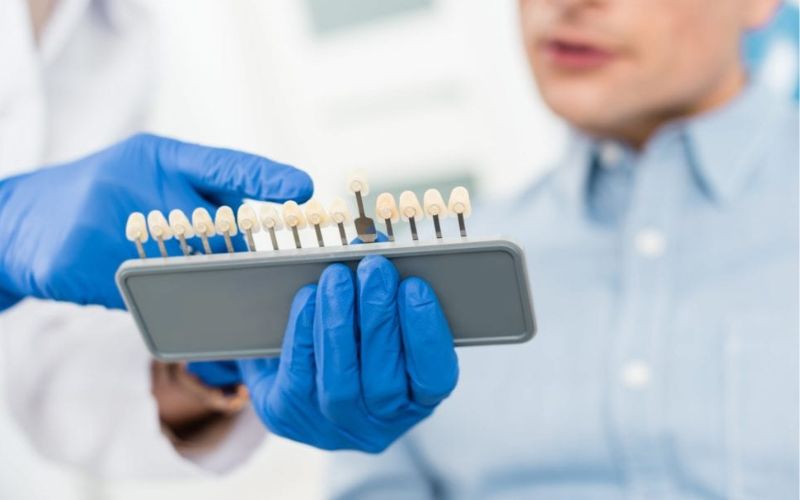Dental implants have a 98% success rate, but just like with any medical procedure, there can be complications that arise.
Dental implants are a great option for patients missing one or more teeth. They look natural, they protect your jawbone, and ultimately, boost your confidence.
Table of Contents
ToggleKey Takeaways
- Dental implants have a high success rate of 98%. They replace both missing tooth and tooth root, supporting the jawbone and maintaining the natural shape of the lips and cheeks.
- A dental implant procedure involves a titanium screw attachment to the jawbone and placement of a crown after recovery. With proper dental hygiene, a crown can last for over 30 years.
- Any adult with good general health can qualify for dental implants. However, people who smoke, have undergone chemotherapy/radiation treatment, have uncontrolled diabetes, suffer from gum disease or are under 18 may face difficulties with implants.
- While uncommon, dental implants can be rejected, leading to side effects such as infection at the implant site, nerve damage, or sinus problems. These can arise due to smoking, autoimmune disorders, poor oral hygiene, or titanium allergies.
- Despite some risks, dental implants have been successfully used for 50 years, providing an effective and durable solution for tooth replacement. In cases of titanium allergy, implant rejection is possible, but rare.
What Are Dental Implants?
A dental implant isn’t just replacing a missing tooth, but it’s also replacing the root of your tooth where a titanium screw will attach to your jawbone. Dentures are a great solution to replacing more than one missing tooth too, but after a while, you may start noticing thinner lips or caved-in cheeks because there is nothing to support them. With implants, your jawbone can remain strong and your lips and cheeks won’t cave in.
After the titanium screw is attached to your jawbone, your mouth will need to recover before the crown is cemented in place. This could take up to six months as your jaw fuses with the new material in your mouth, but once the crown is attached, it won’t heal as slowly as the screw meaning you can get back to your regular diet in no time. A crown can last a lifetime with the proper dental hygiene routine (30+ years). Dental implants can also improve your speech, be easier to eat with, and are more convenient than dentures since they’re permanent.
But like mentioned above, just like with any procedure or surgery, there are risks involved.
Any adult with good general health can qualify for dental implants. You may not qualify if:
- You’re a smoker: Smokers are more likely to experience implant failure and infection compared to non-smokers because of the negative effect nicotine and tobacco have on our teeth and ability to heal. Smoking can also cause a dry mouth and increase the risk of infection as the implant is trying to heal.
- Have undergone chemotherapy/radiation treatment near head/neck: Bone suppression is a common side effect following radiation treatment. Therefore, the jawbone may not fuse well with a new foreign object like a titanium screw. Oral side effects are common too like infections, bleeding or a dry mouth.
- Have uncontrolled diabetes: People with diabetes have a harder time when it comes to healing. If your diabetes isn’t under control, it can be incredibly difficult for your jawbone to fuse with and heal, after receiving an implant, much like people having undergone radiation treatments.
- Suffer from gum disease: Gum disease affects your bone and tissue that surround your teeth. If your gums are receding, they won’t be able to support the dental implant.
- If you’re under 18: If your bones are still growing, there is no point in trying to get your jawbone to accept the implant. It’s best to undergo this procedure as a young adult.
It’s important to point out that you still can qualify for dental implants if you’re a smoker or if you have controlled diabetes or gum disease. If your gums have receded, gum grafting may need to take place in order to support the implant. This could mean a longer healing process, but it’s necessary.

What Happens When Your Dental Implants Are Rejected?
Again, the success rate associated with a dental implant procedure is 98%, but there are rare side effects that one may experience such as:
- Infection at the implant site: This can be a result of smoking, an autoimmune disorder, or lack of oral hygiene.
- Nerve damage: If your implant is placed too close to a nerve you’ll experience numbness or tingling in your tongue, lips, gums or face.
- Sinus problems/allergic reaction/headaches: These issues are all linked to being allergic to titanium. Titanium isn’t as common as other metal allergies so some people may not even know they have one.
Other common symptoms that may be noticed early on are:
- Difficulty chewing in general (including softer food)
- Gum inflammation and swelling
- Severe pain
- Receding gums
Is Titanium Safe?
Dental implants have been used for 50 years now and have been proven to be a safe, effective, and durable solution to improving the appearance of people’s teeth. But, there are patients who may have a titanium allergy without knowing and can, therefore, feel sick from the side effects. Implant rejection can happen, whether it’s dental implants, a knee implant, or a hip implant, but it is very rare.
Frequently Asked Questions
1. What are dental implants?
Dental implants are replacements for missing teeth. They consist of a titanium screw that attaches to your jawbone, mimicking the root of a tooth, and a crown that is placed after your jaw has healed and fused with the titanium.
2. Who is a suitable candidate for dental implants?
Most adults in good general health are potential candidates for dental implants. However, individuals who smoke, have uncontrolled diabetes, undergone head or neck radiation treatments, suffer from gum disease, or are under 18 years may not qualify due to potential risks and complications.
3. What is the success rate of dental implants?
Dental implants have a high success rate of around 98%. However, like any medical procedure, there can be complications and risks.
4. What are the potential complications and risks of dental implants?
While rare, complications can include infection at the implant site, nerve damage, sinus problems, allergic reactions, and implant rejection. Symptoms of these complications can include difficulty chewing, gum inflammation, severe pain, and receding gums.
5. Is titanium used in dental implants safe?
Yes, titanium has been used in dental implants for over 50 years and is generally considered safe, effective, and durable. However, in rare instances, some patients may have a titanium allergy which can cause complications.
Need To Book A Cleaning Appointment?
Our dentists in Hamilton, Ontario are dedicated to helping patients of all ages improve and maintain their oral health. Conveniently located at 684 Main St E, Hamilton, ON L8M 1K5, our dental office provides an array of services including orthodontic treatments. Our general dentists are skilled in assisting patients who wish to straighten their smiles, close gaps in their teeth, and align their jaws.
In addition, we prioritize regular dental cleanings and can schedule appointments that fit into your busy life. Our commitment to personalized care ensures that your visit will be as comfortable and enjoyable as possible.
Whether you’re considering braces or are interested in exploring our other services, don’t hesitate to reach out to us. Contact our dental office at 905-545-4833 to book an appointment. We eagerly anticipate the opportunity to contribute to your oral health and brighten your smile!
No matter your age, dental condition, and if you have a million questions, Dr. Sims can assist you or your young children in a professional manner and loves answering any of your questions or concerns. Dr. Sims grew up in Grimsby playing basketball, so he’s always up for talking about the Raptors! He’s also a football fan - go Buffalo Bills! In his free time, if he’s not watching a basketball game or football game, you’ll likely find him working out, cooking (got any new recipe ideas?), and of course, spending time with his amazing family.
- Tongue Tie Surgery: Medical or Dental? Your Complete Guide - February 28, 2024
- What to Eat After Tooth Extraction - January 16, 2024
- What Medical Professionals Treat Tongue Tie? - January 5, 2024











